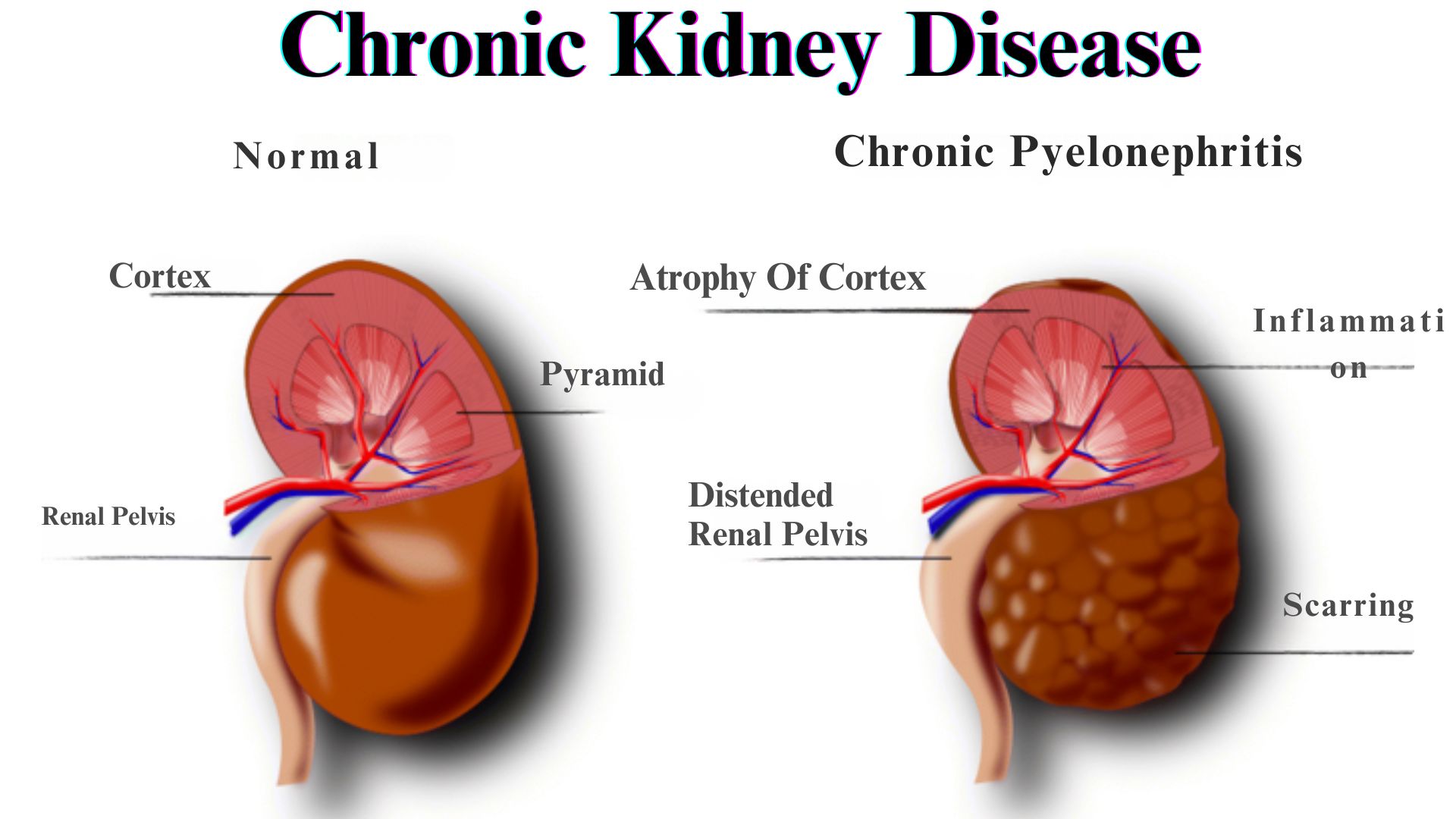Ozempic Chronic Kidney Disease
Understanding Ozempic and Its Uses
Ozempic Chronic Kidney Disease, known as semaglutide, is a medicine mainly used to treat Type 2 Diabetes. It’s part of a category of medicines called GLP-1 receptor agonists, which work by imitating the effects of the natural hormone GLP-1, which regulates blood sugar levels. When administered via injections, Ozempic not only helps to lower blood sugar levels but also aids in weight loss and improves cardiovascular health. This makes it an all-purpose tool for the management of diabetes.
The Role of Ozempic in Treating Diabetes
The efficacy of Ozempic in tackling diabetes centres on its capacity to increase insulin production and reduce glucagon production if the blood sugar level is high. Furthermore, it delays the process of emptying gastric contents and decreases appetite. This contributes to losing weight, which is a crucial aspect in controlling the condition of type 2 diabetes. Clinical trials have revealed substantial gains in HbA1c levels in users, which suggests its effectiveness for long-term management of glucose levels and reducing the risk of complications associated with diabetes.
Connection Between Diabetes and Ozempic Chronic Kidney Disease
Diabetes is the leading factor in kidney diseases that are chronic (CKD). When left uncontrolled, High blood sugar levels could cause irreparable damage to kidney blood vessels as time passes, affecting their capacity to eliminate bloodborne waste effectively. The damage could lead to CKD, a condition in which the kidneys are affected and cannot function efficiently. Controlling the blood sugar levels is essential in reducing the likelihood of getting CKD among diabetic patients, which highlights the necessity of therapies such as Ozempic in the prevention of kidney damage.
What Is Chronic Kidney Disease?
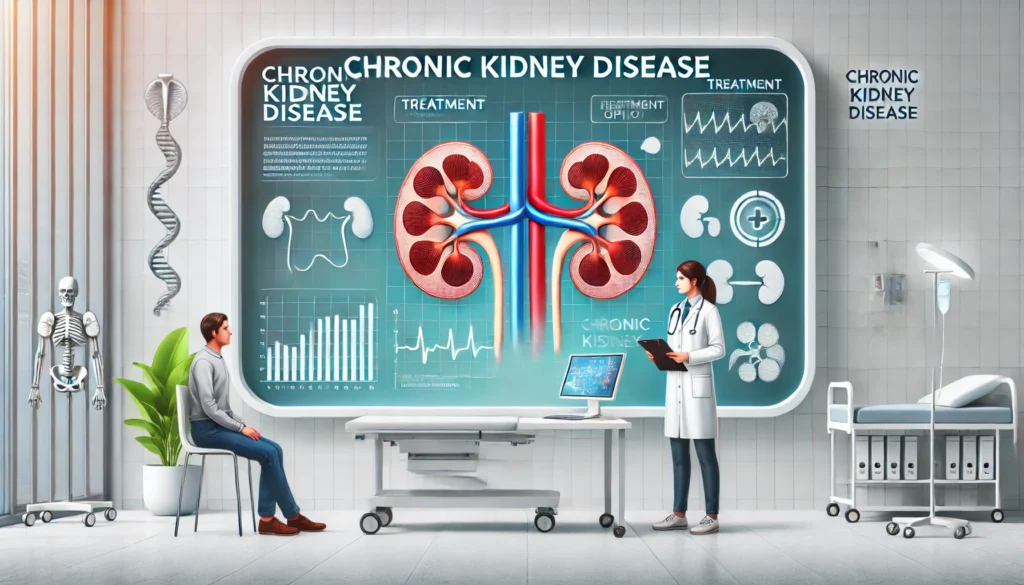
Definition and Stages of Ozempic Chronic Kidney Disease
Chronic Kidney Disease (CKD) is the term used to describe the gradual decline in kidney function with time. The kidneys are essential organs that remove excess fluids and wastes from the bloodstream, which are then eliminated through urine. As CKD develops, the kidneys become less capable of fulfilling these tasks effectively, leading to a build-up of waste and fluids inside the body, which could be detrimental.
CKD generally is divided into five stages according to the glomerular filtration rate (GFR) an indicator of the extent to which your kidneys cleanse the blood of
- Stage 1. Damage to the kidneys with regular or high GFR (>90 mL/min/1.73m2)
- Stage 2. Moderate diminution of GFR (60-89 mL/min/1.73m2)
- Stage 3. Moderate decrease in the GFR (30-59 mL/min/1.73m2)
- Stage 4. Reduction of GFR (15-29 mL/min/1.73m2)
- Stage 5 Kidney failure, or end-stage renal diseases (ESRD) (GFR 15 mL/min/1.73m2)
Causes and Risk Factors of Ozempic Chronic Kidney Disease
The main causes of CKD include diabetes as well as high blood pressure, which is the reason for up to two-thirds of cases. Additional risk factors include:
- The family has a history of kidney disease
- Advanced age
- The ethnicity of the population, which is higher of African Americans, Hispanic Americans, Asians, and American Indians
- Smoking
- Obesity
- Heart disease
Symptoms and Early Detection
Early on, Ozempic Chronic Kidney Disease often has no symptoms. This is why it’s not often detected until the disease has advanced significantly. When kidney function decreases, the symptoms could include:
- The feet are swelling, and the ankles
- Insomnia and fatigue
- The frequency of urination changes as well as the appearance
- Nausea and vomiting
- High blood pressure
- Reduced appetite
Early detection and treatment are essential to stopping the development of CKD. For people at risk, a regular screening program is suggested. It usually involves urine and blood tests to determine markers such as proteinuria (protein in urine) and a lower GFR.
Ozempic’s Impact on Chronic Kidney Disease

How Ozempic Affects Kidney Function
Ozempic Chronic Kidney Disease (semaglutide) principally increases insulin production and reduces glucagon production. This helps reduce glucose levels in the blood. Besides its impact on blood sugar levels, Ozempic’s research has revealed potential benefits to kidney function. Ozempic may boost kidney outcomes by reducing albuminuria (excess urinary protein) and stabilizing the GFR. Its function in weight loss and blood pressure management can indirectly benefit kidney health.
Clinical Studies and Results
Numerous studies have pointed out the benefits of Ozempic for the kidneys. The study AWARD-7 compared the effect of dulaglutide and insulin glargine on patients suffering from type 2 diabetes and moderate-to-severe chronic kidney diseases. The research discovered that using GLP-1 receptor antagonists such as Ozempic resulted in less decrease in kidney function than traditional insulin therapy. It is believed that this may have a more beneficial effect on the kidneys.
Similarity with other diabetes medications
Compared with other medications for diabetes, like SGLT2 inhibitors or conventional insulin, Ozempic has distinct advantages. In addition, SGLT2 inhibitors have beneficial effects on renal function. However, they operate by making the kidneys release more glucose in the urine, which may make them appropriate for everyone who suffers from kidney disease. In contrast, Ozempic’s mode of operation does not require kidney function. It is an effective and safer feature for those suffering from the various levels of CKD.
Benefits of Using Ozempic for CKD Patients
Improvements in Kidney Function
Ozempic (semaglutide) has demonstrated promising payoff in enhancing kidney function among patients with chronic kidney diseases (CKD), especially those suffering from Type 2 Diabetes. The principal mechanism that Ozempic performs is to improve glucose control and decrease the development of kidney damage. Research has shown that Ozempic may decrease albuminuria, an important indicator of damage to the kidneys, and could benefit from stabilizing the decrease in the glomerular filter rate (GFR), which plays a crucial role in preventing the progress of CKD.
Cardiovascular Benefits
In the case of CKD patients, their health is an important concern because they have a greater chance of experiencing cardiovascular problems. Ozempic is a well-known drug for its benefits to cardiovascular health that include the reduction of the chance of major cardiovascular adverse circumstances like stroke, heart attack as well as death due to cardiovascular causes. The benefits are particularly beneficial when it comes to CKD sufferers since cardiovascular disease is still the primary cause of death for the CKD population. The decrease in risk for cardiovascular diseases could be due to Ozempic’s capability to boost aspects such as cholesterol, blood pressure levels, and stiffness of the arterial wall.
Effects on Blood Sugar Levels
Ozempic’s main application as a treatment for type 2 diabetes is the effective control of the blood sugar level. In stimulating the release of insulin reaction to higher blood glucose levels and also reducing the quantity of glucose released through the liver, Ozempic assists in maintaining a regular and stable blood sugar level. This is essential for CKD people suffering from diabetes since stable levels of blood sugar will benefit, limit further kidney damage, and halt the progression of kidney diseases.
Potential Risks and Side Effects
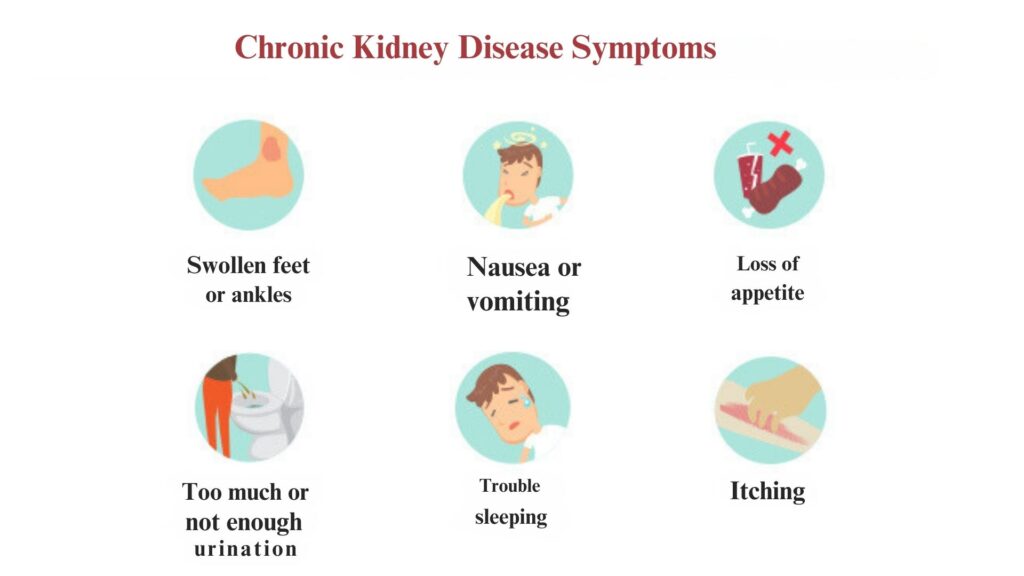
Common Side Effects of Ozempic
Although Ozempic has many benefits, it is also a risky drug with the possibility of negative side effects. Some of the most frequent side effects are digestive symptoms, such as nausea, diarrhea, vomiting, and constipation. These symptoms are usually moderate to mild in intensity and will likely diminish over time as your body adapts to the drug. Certain patients might also experience mild side effects, such as headache, dizziness, and abdominal pain.
Long-term Risks
Long-term health risks associated with Ozempic are currently being studied, and more extensive research is required to comprehend the consequences of long-term usage. There are some questions that have been expressed about the risk of developing pancreatitis, as well as the possibility of an improvement in risk for thyroid cancers, as found in rodent studies. Patients need to regularly follow up with their physician to evaluate any potential long-term negative side effects that might arise.
Considerations for CKD Patients
When treating CKD sufferers, specifically patients with advanced diseases, certain aspects must be considered when with Ozempic. It is vital to alter dosages on time and monitor the kidneys’ functions carefully since changes in kidney function could impact drug clearance and general metabolism. Additionally, health professionals are advised to assess the possibility of fluid retention or worsening kidney function. These may be made worse with any anti-diabetic drug, including Ozempic.
Patient Management and Care of Ozempic Chronic Kidney Disease
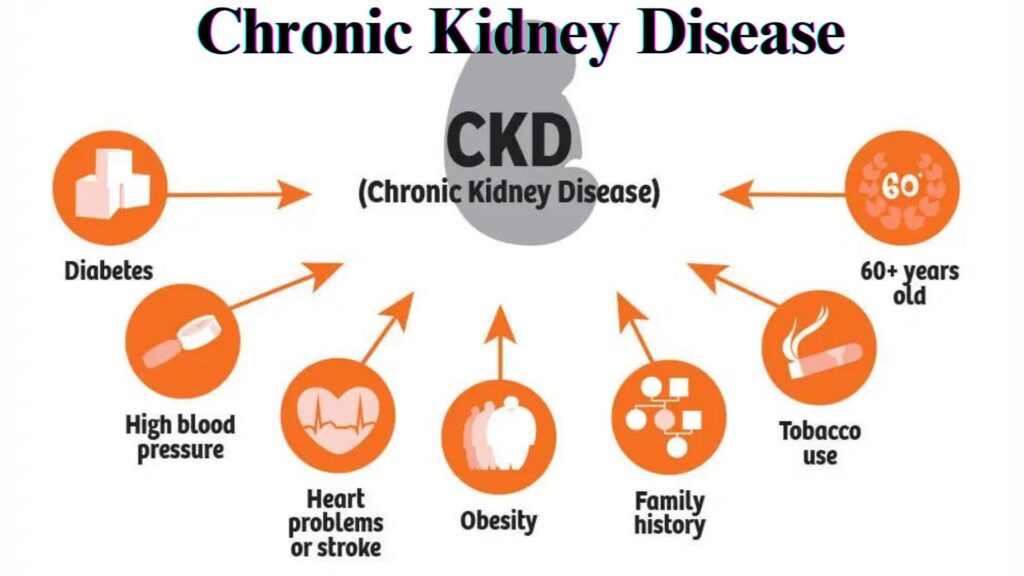
Lifestyle Modifications
The treatment of the Ozempic Chronic Kidney Disease energetically often requires extensive lifestyle adjustments, especially in patients with drugs such as Ozempic. Regular exercise, keeping a healthy weight, and quitting smoking are essential. Physical exercise is a great way to control blood sugar levels, lower blood pressure, and maintain the health of your heart. All of these are essential for CKD sufferers. Furthermore, strategies for stress management, such as yoga and meditation, could be helpful since stress can increase the risk of developing diabetes, which can lead to kidney disease.
Diet and Nutrition Advice
Diet is a key factor in the management of CKD, particularly for those with medications such as Ozempic. It is essential to reduce the consumption of sodium, potassium, and phosphorus to reduce kidney burden. It is recommended that their protein intake be limited to stop the development of kidney disease. A dietitian might suggest an eating plan focused on consuming healthy food items, like fruits, veggies, Whole grains, and lean protein. Controlling fluid intake is essential to prevent overloading of the kidneys.
Monitoring and Regular Check-ups
A regular monitoring program is crucial to controlling CKD through Ozempic. The patients should be regularly checked to monitor the kidneys’ functioning, blood sugar levels, and other important health indicators, such as electrolytes and blood pressure. The healthcare provider can alter the dosage of Ozempics following the kidney function test and other factors. Regular eye and foot examinations are important as diabetes could cause complications in these regions.
Future Perspectives and Research
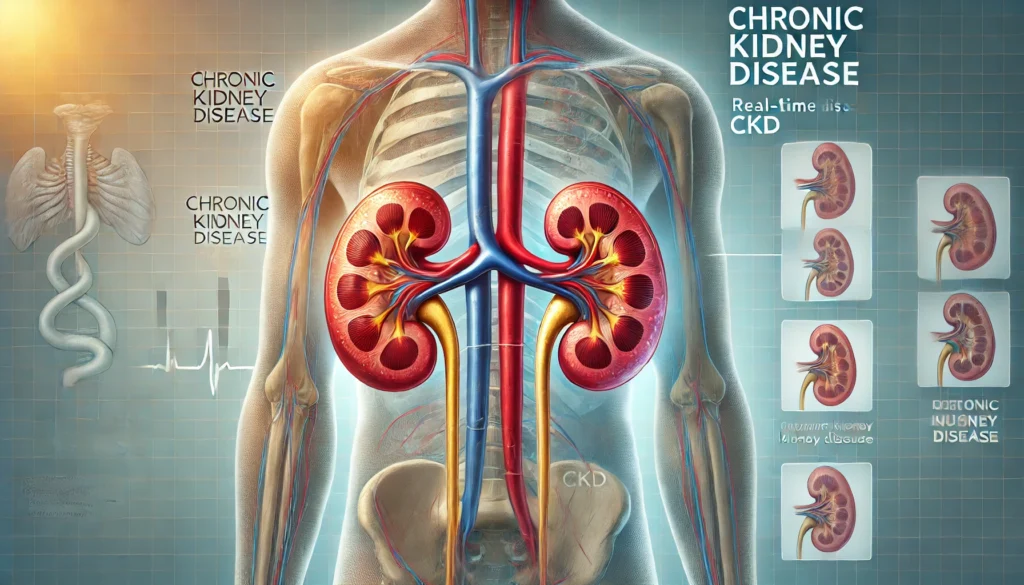
Ongoing Studies on Ozempic Chronic Kidney Disease
Ozempic Chronic Kidney Disease is becoming clearer, and research needs to be conducted regarding the effectiveness of Ozempic in treating CKD in patients with diabetes. Current studies focus on long-term payoff, the best dosage, and the safety of the medication. The researchers are especially concerned about how semaglutide, the active ingredient of Ozempic, affects kidney function over a long time and if it can delay the development of end-stage kidney disease among people suffering from type 2 diabetes.
Innovations in Treatment Approaches
The area of diabetes-related kidney disease is experiencing major advancements, such as the introduction of new treatments and classes of drugs. Of these, GLP-1-agonists such as Ozempic are among the most innovative. Interest in combination therapies is growing, which could increase the patient’s outcomes without impacting security. The new approaches are targeted toward managing CKD and possibly reversing its progress.
The future of treatment for CKD by GLP-1 Agonists
The future is bright concerning applying GLP-1 antagonists as part of CKD treatment. Based on ongoing research, the possibility of these medications becoming an integral part of the treatment plan for Ozempic Chronic Kidney Disease is in its early stages for diabetics. The ability of GLP-1 receptor agonists to benefit cardiovascular health and improve kidney function makes them an essential component of the multidisciplinary approach to treating CKD. When more information becomes accessible, guidelines are likely to be updated to reflect this new knowledge and offer hope to those who are struggling with the twin challenges of kidney disease and diabetes.
Conclusion
Ozempic Chronic Kidney Disease is an intriguing avenue in medical treatments, especially for patients who are struggling with the twin challenges of diabetes and CKD. The evidence is mounting on the advantages of GLP-1 agonists such as Ozempic, which include improved kidney function and cardiovascular health. The possibility of the medications transforming CKD treatment is becoming more evident.
As research continues to focus on increasing dosages of treatments and innovations that might help reverse the progression of the disease, the future promises to be better for improving patient outcomes and the quality of care. While the medical profession continues to research and improve treatment options, patients and medical professionals can believe in the advances for managing Ozempic Chronic Kidney Disease.
FAQs About Ozempic Chronic Kidney Disease
Q1: what exactly is Ozempic, and how can it benefit people suffering from chronic kidney problems?
Ozempic (semaglutide) can control type 2 diabetes by increasing insulin production and reducing high blood sugar levels. In the case of CKD sufferers, Ozempic Chronic Kidney Disease has shown promise in reducing kidney disease due to its ability to increase glucose control and benefit cardiovascular health.
Q2: Does Ozempic be used by any CKD sufferers?
Ozempic is appropriate for CKD patients who suffer from Type 2 diabetes, especially those in the initial to moderate stage of kidney disease. But, it should be carefully evaluated by medical professionals, specifically those with advanced kidney disease. Depending on their general condition and kidney function, it may not be appropriate for every patient.
Q3: What could be the adverse effects of Ozempic Chronic Kidney Disease?
Ozempic Chronic Kidney Disease is generally tolerated. However, it may cause adverse consequences such as abdominal discomfort, nausea, and a higher chance of developing diabetic Retinopathy. CKD patients may also have to be aware of signs of increased fluid retention or shifts in urine output since these may indicate a rise in kidney function.
Q4: How often must CKD patients taking Ozempic be monitored by a doctor?
Patients, together with Ozempic, who treat CKD must have regular checks every three to six months or at the direction of their physician. They typically consist of tests to assess the kidney’s function (e.g., blood creatinine levels, serum creatinine levels, EGF), blood sugar levels, and other important health indicators.
Q5: Do you have any diet suggestions for Ozempic Chronic Kidney Disease?
It is suggested that Ozempic Chronic Kidney Disease maintain a diet that is low in sodium, potassium, and phosphorus to ease the pressure on the kidneys. Furthermore, controlling protein intake and choosing heart-healthy foods are essential to maintaining general kidney and cardiovascular health. Consultation with a dietitian will offer additional dietary advice specific to your individual needs and treatment goals.
